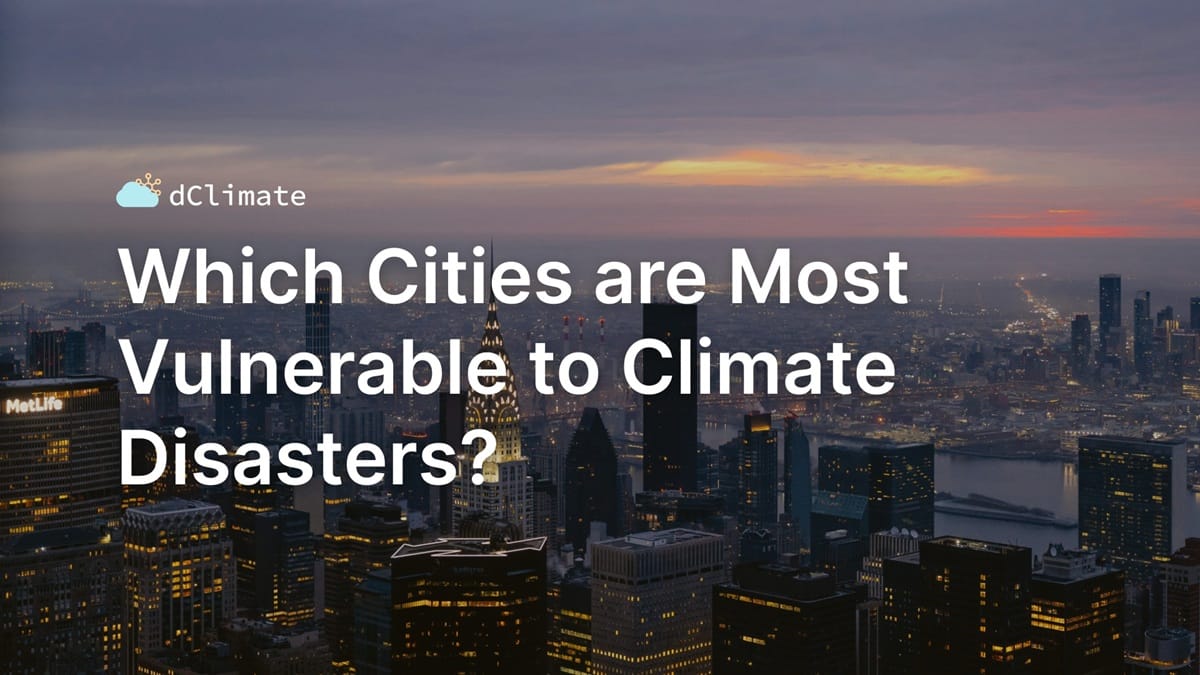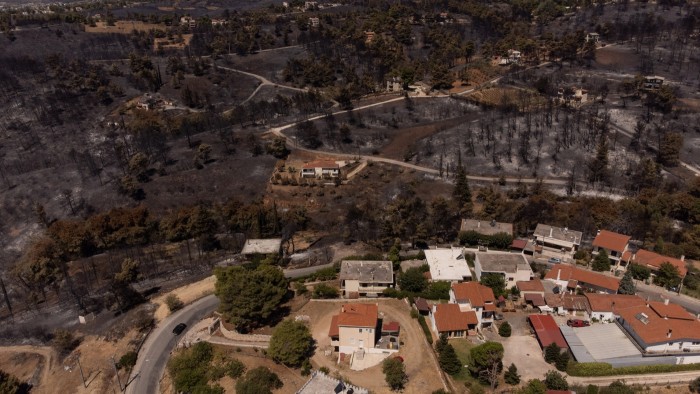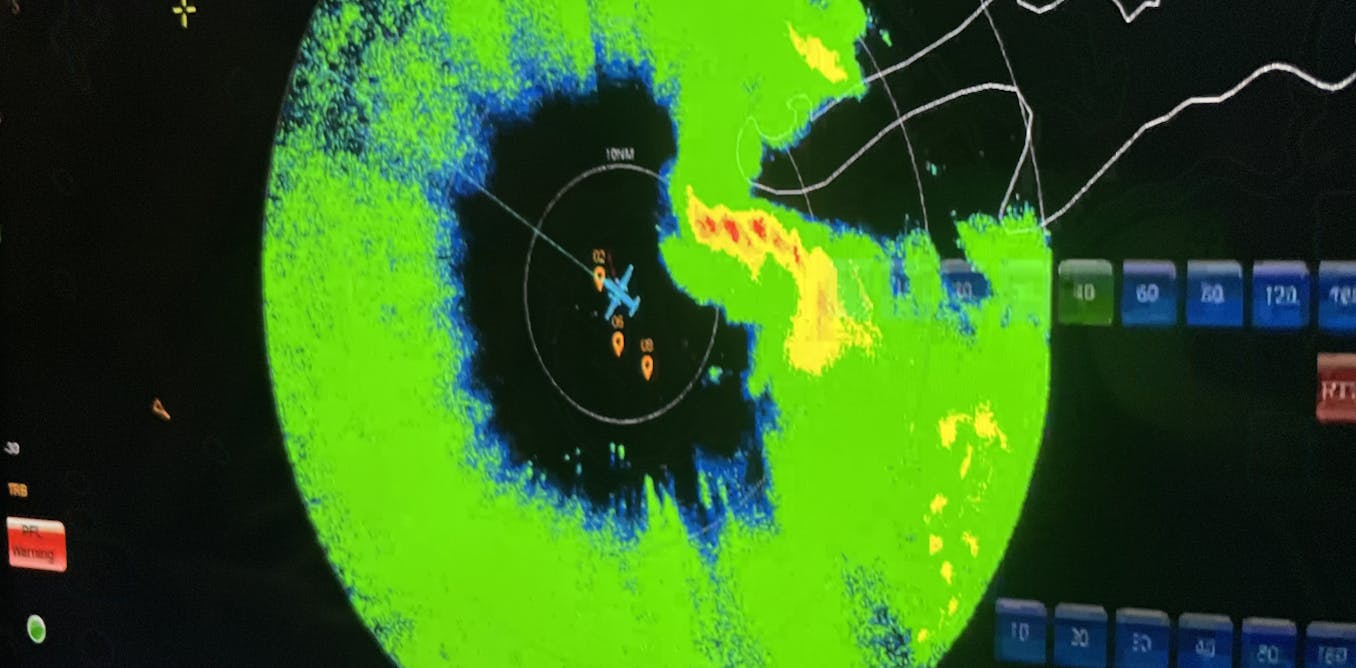Which Cities are Most Vulnerable to Climate Disasters? | Data ReFined #55

⛅ Data ReFined is dClimate's biweekly newsletter, delivering insights at the intersection of climate risk management, the voluntary carbon market (VCM), and climate intelligence.
In this edition:
Climate Risk Management
🛡️ The Cities Most Vulnerable to Climate Disasters
🛡️ Insured Losses from Natural Catastrophes on Trend to USD 145B in 2025
🛡️ How Should EU and UK Banks Manage Climate-related Risks?
🛡️ Most Floridians Concerned about Maintaining Homeowners Insurance
Carbon Finance & Digital MRV
🌳 Billions of Dollars Continue to Flow into the VCM
🌳 France's Charter Promotes Accountability in Carbon Markets
🌳 Senken Acquires Ivy to Offer Carbon Forwards
Climate Data & Intelligence
🌎 Proposed Budget Cuts at NOAA Threatens Climate Resilience
🌎 ESA Releases Longest-Ever Dataset on Forest Biomass
Scroll down for more details! 👇
Subscribe here and join over 4500+ readers!

The Cities Most Vulnerable to Climate Disasters
The expansion of cities into natural landscapes has created a perilous wildland-urban interface, making urban centers like Athens, Greece "sitting ducks" for climate disasters. This intersection of human development and natural environments amplifies the risks of wildfires and floods.
Why this matters
The overlap between natural ecosystems and urban sprawl calls for climate tools that can map risk in real time and guide smarter growth strategies.


Insured Losses from Natural Catastrophes on Trend to USD 145B in 2025
According to a new report from Swiss Re, global economic losses from natural catastrophes reached USD 328 billion in 2024, of which 57% were uninsured. The article highlights the need to address these gaps to ensure comprehensive coverage and financial resilience against climate-induced events. Read more →

How Should EU and UK Banks Manage Climate-related Risks?
According to White & Case, climate risk management has shifted from a CSR checkbox to core business strategy for banks across the UK and EU. Financial institutions must now embed climate risk into the heart of their operations or face real regulatory and market consequences. Read more →
Most Floridians Concerned about Maintaining Homeowners Insurance
The recent Florida Climate Survey reveals that more than half of Floridians (54%) worry that climate change will impact their ability to afford and maintain homeowners insurance, with 90% of survey respondents being concerned about hurricanes increasing in strength and/or frequency. Read more →

Billions of Dollars Continue to Flow into the VCM
Despite scrutiny over carbon credit integrity, companies active in the voluntary carbon market (VCM) raised over $1.48 billion in the first quarter of 2025, with project developers leading the charge.
Why this matters
The influx of capital, including involvement of financial institutions, in the VCM signals mainstream acceptance and potential for market growth.

France's Charter Promotes Accountability in Carbon Markets
France has launched a Carbon Credit Charter, endorsed by 17 major companies, to promote high-integrity carbon credit usage aligned with VCMI’s best practices. Government-backed initiatives like this can accelerate corporate commitment to credible climate action. Read more →
Senken Acquires Ivy to Offer Carbon Forwards
Senken’s integration of Ivy Protocol’s pre-financing tools allows corporate buyers to secure carbon credits before market entry, ensuring supply security and alignment with sustainability values. Read more →

Proposed Budget Cuts at NOAA Threatens Climate Resilience
NOAA has significantly improved hurricane forecasting accuracy over the past decade—but proposed funding cuts now threaten that progress just as an active Atlantic hurricane season approaches.
Why this matters
Climate resilience depends on strong public data infrastructure, cutting it undermines preparedness at every level.

ESA Releases Longest-Ever Dataset on Forest Biomass
ESA's new dataset integrates observations from multiple satellite missions spanning two decades, providing detailed insights into forest biomass at resolutions ranging from 100 meters to 50 kilometers. This granularity supports improved climate and carbon modeling efforts. Read more →
Thank You For Reading Our Newsletter! 💙
We greatly appreciate your interest and support! If you enjoyed this newsletter, please consider forwarding it to your network to increase awareness of these critical climate topics.
About dClimate
dClimate’s decentralized and open climate data infrastructure powers a wide range of solutions, including climate risk assessments, parametric insurance, and climate intelligence platforms for carbon and commodity markets.
⛅ Visit our website | 📊 Discover our climate tech solutions
Join the Mission
We welcome your comments, feedback, and likes. Follow us on the channels below to stay updated and start exploring our open climate data ecosystem. 👇




